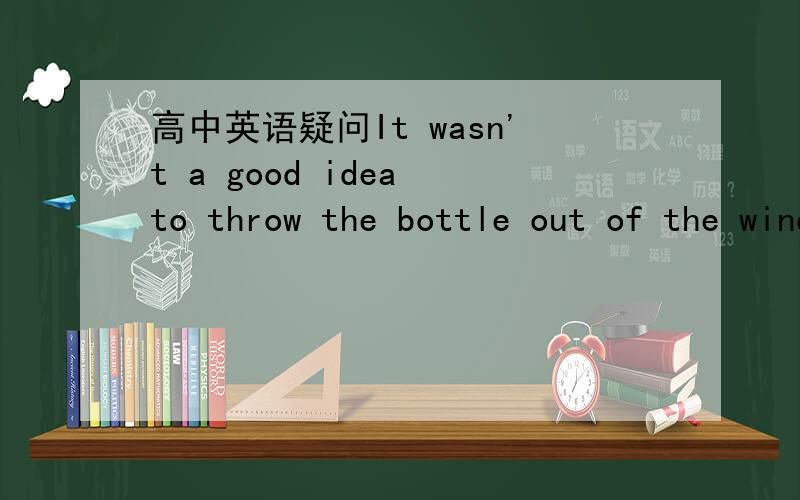й«ҳдёӯиӢұиҜӯз–‘й—®It wasn't a good idea to throw the bottle out of the window.It____ hit somebody.A.would have B.should have C.could have D.must have1\йҰ–е…ҲдёәдҪ•иҰҒз”ЁиҷҡжӢҹ?пјҲABCDйғҪз”ЁдәҶиҷҡжӢҹпјү2\дёәд»Җд№Ҳз”Ёcould haveдёҚз”Ёwould have,жңүд»Җ
жқҘжәҗпјҡеӯҰз”ҹдҪңдёҡеё®еҠ©зҪ‘ зј–иҫ‘пјҡдҪңдёҡеё® ж—¶й—ҙпјҡ2024/11/17 18:44:39

й«ҳдёӯиӢұиҜӯз–‘й—®It wasn't a good idea to throw the bottle out of the window.It____ hit somebody.A.would have B.should have C.could have D.must have1\йҰ–е…ҲдёәдҪ•иҰҒз”ЁиҷҡжӢҹ?пјҲABCDйғҪз”ЁдәҶиҷҡжӢҹпјү2\дёәд»Җд№Ҳз”Ёcould haveдёҚз”Ёwould have,жңүд»Җ
й«ҳдёӯиӢұиҜӯз–‘й—®
It wasn't a good idea to throw the bottle out of the window.
It____ hit somebody.
A.would have B.should have C.could have D.must have
1\йҰ–е…ҲдёәдҪ•иҰҒз”ЁиҷҡжӢҹ?пјҲABCDйғҪз”ЁдәҶиҷҡжӢҹпјү
2\дёәд»Җд№Ҳз”Ёcould haveдёҚз”Ёwould have,жңүд»Җд№ҲеҢәеҲ«?
3\ could have дёҺmight have иҝҷеҸҜд»Ҙз”Ё might have
ж„ҹжҝҖ!
й«ҳдёӯиӢұиҜӯз–‘й—®It wasn't a good idea to throw the bottle out of the window.It____ hit somebody.A.would have B.should have C.could have D.must have1\йҰ–е…ҲдёәдҪ•иҰҒз”ЁиҷҡжӢҹ?пјҲABCDйғҪз”ЁдәҶиҷҡжӢҹпјү2\дёәд»Җд№Ҳз”Ёcould haveдёҚз”Ёwould have,жңүд»Җ
иҝҷйҮҢиҖғжҹҘзҡ„дёҚжҳҜиҷҡжӢҹиҜӯж°”,жҳҜжғ…жҖҒеҠЁиҜҚ+have done иЎЁзӨәеҜ№иҝҮеҺ»зҡ„жғ…еҶөиҝӣиЎҢжҺЁжөӢ.
could have done еҜ№иҝҮеҺ»зҡ„дәӢжғ…иҝӣиЎҢиӮҜе®ҡзҡ„жҺЁжөӢ,ж„ҸжҖқжҳҜвҖңд№ҹи®ёдјҡ...вҖқ
would have doneеҸӘз”ЁеңЁиҷҡжӢҹиҜӯж°”зҡ„дё»еҸҘдёӯ,жүҖд»ҘиҝҷйҮҢдёҚеҜ№.
should have doneиЎЁзӨәиҝҮеҺ»жң¬еә”иҜҘеҒҡжҹҗдәӢиҖҢе®һйҷ…дёҠжІЎеҒҡ,еҗ«жңүиҙЈеӨҮзҡ„ж„ҸжҖқ.
еҰӮпјҡYou couldn't remember his address.You should have written down the address for him.
might have doneеҸҜд»ҘиЎЁзӨәеҜ№иҝҮеҺ»зҡ„дәӢжғ…зҡ„иӮҜе®ҡжҺЁжөӢ,дҪҶжҳҜиҜӯж°”жҜ”couldиҫғејұ.
дёӢйқўз»ҷдҪ дёҖд»Ҫиө„ж–ҷдҫӣдҪ еҸӮиҖғ
.еҜ№иҝҮеҺ»жғ…еҶөзҡ„жҺЁжөӢ,з”ЁвҖңжғ…жҖҒеҠЁиҜҚ + have +иҝҮеҺ»еҲҶиҜҚвҖқ.
пјҲ1пјүIt must / may / might / could have rained last night .The ground is wet.
ең°ж№ҝдәҶ,жҳЁжҷҡиӮҜе®ҡ/еҸҜиғҪ/д№ҹи®ёдёӢйӣЁдәҶ.
пјҲ2пјүThe door was locked.He can ( could ) not / may ( might ) not have been at home .
й—Ёй”ҒзқҖ,д»–дёҚеҸҜиғҪ/еҸҜиғҪдёҚеңЁе®¶.
пјҲ3пјүCan / Could he have gotten the book?
йҡҫйҒ“д»–жүҫеҲ°д№ҰдәҶеҗ—?
жіЁпјҡжғ…жҖҒеҠЁиҜҚ should /ought toиЎЁжҺЁжөӢж—¶,ж„ҸдёәвҖңжғіеҝ…дјҡ,зҗҶеә”вҖҰвҖҰвҖқ
дёҺвҖңhave +иҝҮеҺ»еҲҶиҜҚвҖқиҝһз”Ёж—¶,ж„ҸдёәвҖңжң¬еә”иҜҘеҒҡжҹҗдәӢеҚҙжІЎеҒҡвҖқ.дҫӢеҰӮпјҡ
пјҲ4пјүItвҖҷs seven oвҖҷclock.Jack should/ought to be here at any moment.
зҺ°еңЁдёғзӮ№й’ҹдәҶ,жқ°е…ӢзҗҶеә”йҡҸж—¶еҲ°иҫҫ.пјҲжҺЁжөӢпјү
пјҲ5пјүShe should / ought to have attended your birthday party,but she had to look after her mother in hospital.
еҘ№жң¬иҜҘеҮәеёӯдҪ зҡ„з”ҹж—Ҙжҷҡдјҡзҡ„,еҸҜжҳҜеҘ№еҫ—еңЁеҢ»йҷўз…§йЎҫеҘ№еҰҲеҰҲ.
пјҲ6пјүTom should not /ought not to have told me your secret,but he meant no harm.жұӨе§Ҷжң¬дёҚиҜҘе‘ҠиҜүжҲ‘дҪ зҡ„з§ҳеҜҶ,еҸҜжҳҜд»–е№¶ж— жҒ¶ж„Ҹ.
йҰ–е…ҲпјҢи°Ғе‘ҠдҪ е®ғз”ЁиҷҡжӢҹдәҶгҖӮиҝҷйҮҢиҖғеҜҹжғ…жҖҒеҠЁиҜҚзҡ„иҜӯж°”ејәзғҲзЁӢеәҰе’ҢжүҖеҒҸеҗ‘зҡ„ж„ҸжҖқгҖӮmustиҜӯж°”еӨӘејәпјҢеҸҜеҪ“дҪңдёҖе®ҡдјҡеҸ‘з”ҹпјҢдёҚз¬ҰгҖӮиҝҷйҮҢдёҚз”ЁиҷҡжӢҹиҜӯж°”гҖӮAйҖҡеёёиЎЁзӨәвҖңеә”иҜҘвҖқеҸ‘з”ҹзҡ„жғ…еҶөгҖӮshouldеҗҺи·ҹе®ҢжҲҗж—¶иЎЁзӨәдёҺдәӢе®һзӣёеҸҚзҡ„жғ…еҶөгҖӮеҗҢж—¶ж №жҚ®иҜӯж„ҸпјҢиҝҷйҮҢеә”иҜҘеЎ«вҖңеҸҜиғҪвҖқеҸ‘з”ҹзҡ„жғ…еҶөгҖӮmightзҡ„иҜӯж°”жҜ”couldзӣёеҜ№иҫғејұгҖӮиҖҢиҝҷйҮҢиҜҙиҜқдәәжңүз§ҚиӯҰе‘Ҡзҡ„ж„ҸжҖқпјҢд№ҹдёҚеӨӘеҘҪ...
е…ЁйғЁеұ•ејҖ
йҰ–е…ҲпјҢи°Ғе‘ҠдҪ е®ғз”ЁиҷҡжӢҹдәҶгҖӮиҝҷйҮҢиҖғеҜҹжғ…жҖҒеҠЁиҜҚзҡ„иҜӯж°”ејәзғҲзЁӢеәҰе’ҢжүҖеҒҸеҗ‘зҡ„ж„ҸжҖқгҖӮmustиҜӯж°”еӨӘејәпјҢеҸҜеҪ“дҪңдёҖе®ҡдјҡеҸ‘з”ҹпјҢдёҚз¬ҰгҖӮиҝҷйҮҢдёҚз”ЁиҷҡжӢҹиҜӯж°”гҖӮAйҖҡеёёиЎЁзӨәвҖңеә”иҜҘвҖқеҸ‘з”ҹзҡ„жғ…еҶөгҖӮshouldеҗҺи·ҹе®ҢжҲҗж—¶иЎЁзӨәдёҺдәӢе®һзӣёеҸҚзҡ„жғ…еҶөгҖӮеҗҢж—¶ж №жҚ®иҜӯж„ҸпјҢиҝҷйҮҢеә”иҜҘеЎ«вҖңеҸҜиғҪвҖқеҸ‘з”ҹзҡ„жғ…еҶөгҖӮmightзҡ„иҜӯж°”жҜ”couldзӣёеҜ№иҫғејұгҖӮиҖҢиҝҷйҮҢиҜҙиҜқдәәжңүз§ҚиӯҰе‘Ҡзҡ„ж„ҸжҖқпјҢд№ҹдёҚеӨӘеҘҪ
收иө·